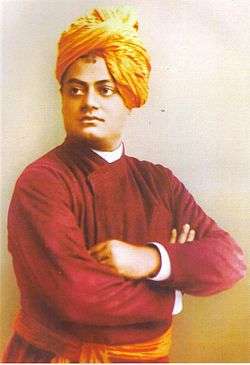Vishwanath Datta
Vishwanath Datta (1835 – 25 February 1884) was a Bengali barrister, philanthropist and novelist. He was the father of Swami Vivekananda, Mahendranath Dutta and Bhupendranath Dutta.[1]
Vishwanath Datta | |
|---|---|
| Born | 1835 North Kolkata |
| Died | 25 February 1884 Calcutta, West Bengal |
| Language | Bengali |
| Nationality | Indian |
| Subject | Barrister, novelist |
| Spouse | Bhubaneshwari Devi (1841 - 25 July 1911) |
| Children | Swarnabala, Narendranath, Mahendranath, Bhupendranath |
Early life
Vishwanath was born in an aristocratic Hindu family of North Kolkata. His father Durgaprasad (1816–1850 or 1855) preferred Sannyas life and left home when Vishwanath was six years old only. There is an interesting incident when he longed to return to Calcutta after five years of wandering for sanyass which Swami Vivekananda used to listen in his childhood. It happened so that, in somewhere between 1845 or 1846 Durgaprasad returned to Calcutta, He was recognised by one of his neighbours who locked him in a tiny room in his house so he cannot escape and remain in a starving condition as Sanyassi. He was locked in this room for 3 days. At last, on the third day the neighbour's wife Sarita Devi took pity on him and helped him escape from the house. Later Vishwanath was brought up by his uncle. He entered in Gourmohan Addy's school or Oriental Seminary. After completion of graduation in 1879 Datta worked as a clerk under an attorney, Charles F. Peter.[2]
Career
Datta was an enlightened person of the 18th century, free from religious superstitions, known for his charity and liberal outlook. He was well versed in Sanskrit, Hindi, Persian, Arabic and Urdu languages.[3]
He married Bhuvaneswari Devi in 1851 and Swami Vivekananda was born in 1863.[4]
In 1866 he applied for the post of proctor to Sir Barnes Peacock, the first Chief Justice of Calcutta High Court. His prayer was approved by Justice Walter Morgan (judge). Datta also maintained a law firm in Kolkata named Dhar & Datta. Later he faced serious economic troubles for frequent litigation and lawsuits among Datta family.[5]
Literary works
Datta wrote a Bengali autobiographical novel named Sulochana based on a joint family dispute. In 1882 the novel was first published in Kolkata.[6]
References
- Chowdhury, Satyam Roy (2016-09-01). VIVEKANANDA FOR YOU ( ENGLISH ). Techno India.
- Mohapatra, Kalpana (1996). Political Philosophy of Swami Vivekananda. Northern Book Centre. ISBN 9788172110796.
- P. R. Bhuyan. "Swami Vivekananda: Messiah of Resurgent India". Retrieved February 12, 2018.
- VOL LI, No 20 (May 4, 2013). "Swami Vivekananda: A Life Divine". Retrieved February 12, 2018.
- Samkara. "The Monk as Man: The Unknown Life of Swami Vivekananda". Retrieved February 12, 2018.
- "Viswanath Datta". Retrieved February 12, 2018.
